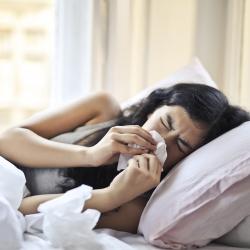Allergic rhinitis – seasonal or perennial
What is hayfever?
Hayfever, also called seasonal allergic rhinitis is considered a hypersensitivity of the nasal mucosa that causes cold-like symptoms. However, these symptoms are not caused by a virus but by an allergic response of the body to normally harmless outdoor or indoor substances such as grass, tree or flower pollen, dust mites or animal dander (allergens). Allergic rhinitis can occur all year round (perennial) particularly if caused by indoor allergens. But symptoms might start or get worse at certain times of the year (seasonally) if caused by pollen which typically occur from early spring until autumn.
What are the symptoms?
Hayfever symptoms include frequent, sudden attacks of sneezing, nasal congestion and itchy, watery eyes, a cough as well as a feeling of heat and tiredness. It can interfere with daily life and affect people’s performance at work, school and recreational activities as well as sleep. People who suffer heavily from it often try to avoid allergens which might prevent them from going out at times of high pollen count or from having a pet.
Can anyone get hayfever?
Unfortunately, anyone can develop hayfever, at any stage in life due to hormonal changes or changes in their general health. For example if a person’s immune system is compromised they can suddenly develop hayfever symptoms to allergens which their body used to tolerate. There is also a link of an increase in seasonal allergic rhinitis and climate change.
Can acupuncture help?
Regular acupuncture can improve the body’s immune system and general well-being and hence reduce symptoms of allergic rhinitis. During hayfever season treatment will focus on minimising acute symptoms and may include needling local points on the head or around the nose as well as cupping on the back. During the rest of the year the focus is on maintaining and boosting the system’s natural defence mechanism and in addition to needles sometimes moxibustion – burning of the herb mugwort over an acupuncture point – is used.
In more scientific terms recent studies have shown acupuncture’s ability to significantly reduce total levels of IgE, reduce inflammation, enhance natural killer cell activity and increase local micro-circulation which aids dispersal of swelling.
There is evidence that acupuncture has a comparable effect to medication in patients with moderate to severe allergic rhinitis and that it can even be a cost effective way of treatment.
If you are in doubt whether acupuncture could be beneficial for you please don’t hesitate to get in contact and book a consultation with our acupuncture team.
Our Barnes Clinic
Our clinic is located in Barnes, South-West London and is easily accessible by public transport.
For more information including parking and other practicalities see our Barnes clinic page
Book an Appointment
Booking an appointment with one of our therapists is quick and easy. There is no long waiting time and you don’t need a referral from your GP.





